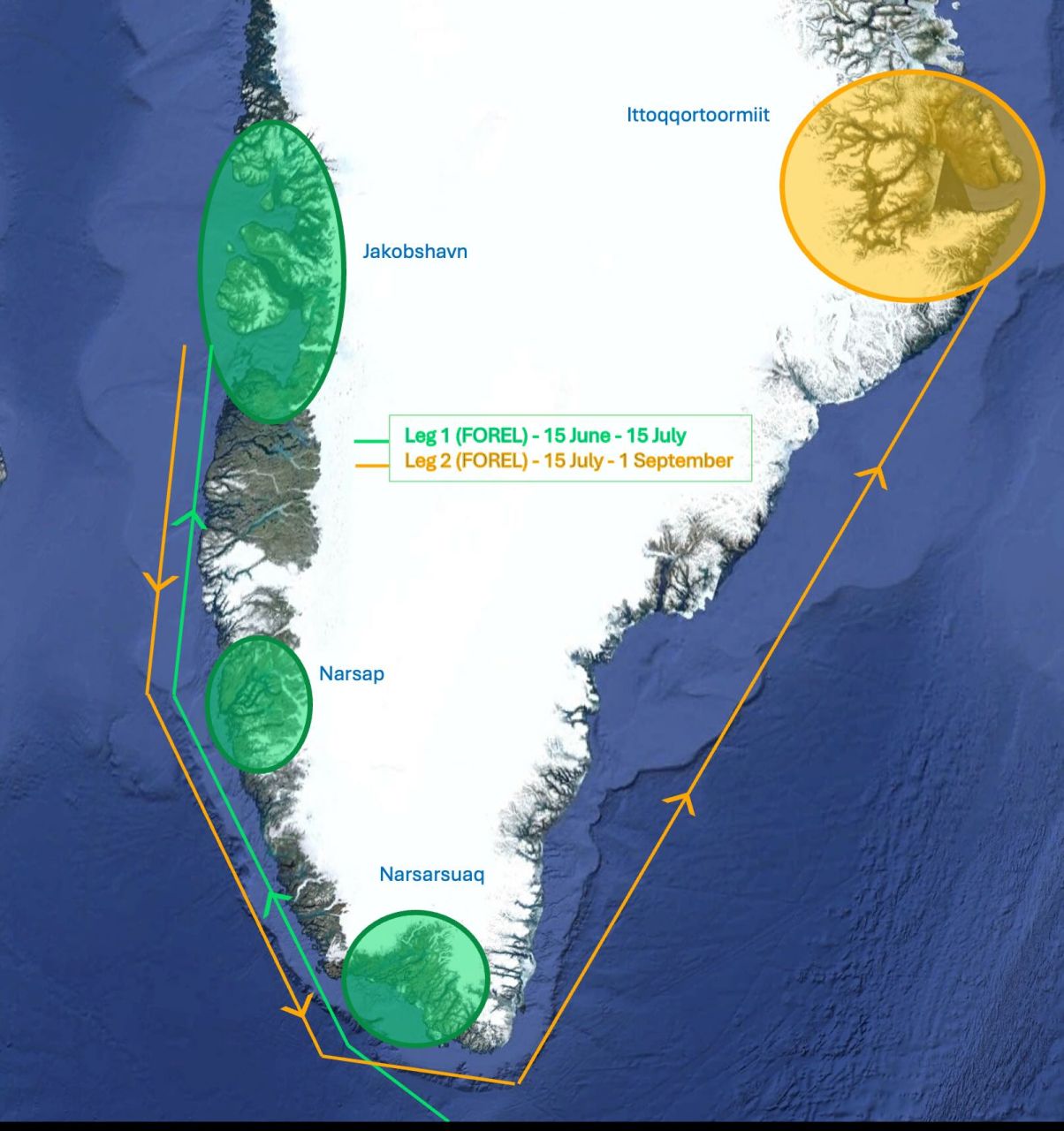Call for Proposals 2026
East Greenland
Deadline for applications: 15 June 2025, 12:00 (Swiss time)
About the FOREL RESEARCH PLATFORM
FOREL is a sailing vessel (aluminium hull, 29 m long, 1.75 m draft) managed by the Forel Heritage Association and dedicated to oceanographic research in polar and sub-polar regions, specifically in coastal areas inaccessible to larger research vessels. As the number of berths for scientists is limited to 6, we encourage teams to coordinate and, where possible, join forces. Coordination between projects is encouraged to ensure FOREL gets the maximum value out of each campaign.
See boat technical details
The Forel Heritage Association is aiming at supporting Polar and sub-Polar coastal research and remediation with a strong emphasis on the land – ocean – atmosphere continuum and the application of converging technologies. This includes the development of new technological platforms and approaches. Promoting collaboration and exchanges with local communities as well as training young polar researchers are also given high priority.
Applicants are invited to take note of the following details of the 2026 FOREL expedition
The CASCADES expedition is a joint initiative of the Institut Nordique du Québec (INQ), the Swiss Polar Institute (SPI) and the French Polar Institute Paul-Émile Victor (IPEV) aiming to foster scientific collaboration between the scientific communities of Switzerland, France and the Canadian programme Transforming Climate Action (TCA).
The CASCADES expedition will focus on the coastal region of West-Greenland, Baffin Bay and Ellesmere Island. The FOREL-CASCADES expedition will focus only on the West-Greenland coast. Sampling via the research sailing vessel FOREL will precede that carried out with the Canadian icebreaker CCGS Amundsen.
Following the completion of the CASCADES program, FOREL will be available for a research campaign on Greenland’s east coast (Leg 2). This call for projects specifically concerns only the east coast of Greenland campaign on FOREL.
Leg 1: From 15 June to 15 July 2026, scientific work on board FOREL will be embedded into the CASCADES expedition’s scientific plan and focus on complementary regions to those covered by the CCGS Amundsen with the goal to broaden the geographic coverage and scientific scope of the of the expedition (https://swisspolar.ch/expeditions/cascades/).
Leg 2: From 15 July to 1 September 2026, FOREL will carry out an independent campaign and focus its scientific work around the more rarely visited areas of East Greenland (see map).
Swiss researchers can apply for legs 1 and 2 through the SPI platform. Canadian researchers can apply for leg 1 via INQ/TCA. Foreign researchers (including Canadian) can apply for leg 2 through the Forel Heritage Association call for proposal.
The ports of call will be determined at a later stage based on the submitted programs. However, it will not be possible to rotate or change research teams at every stop.
Calendar
The FOREL 2026 summer season will comprise two legs (see map):- Leg 1: 15 June to 15 July, South-West Coast of Greenland
- Leg 2: 15 July to 1 September, East Coast of Greenland
Target public
Eligibility as Principal Investigator (PI) is limited to established researchers or post-docs. The call for proposal is open to all researchers employed by an academic or governmental institution.
Researchers from all fields, also fields considered as “non-typical” for polar sciences (e.g. engineering, materials, medicine, humanities and social sciences, etc.), are encouraged to apply if they have a project to be conducted in a polar context.
Environmental impact
In view of promoting innovative and sustainable research methods, applicants are asked to take a thoughtful approach weighing the merits of the proposed project against its environmental impact. The proposal should reflect efforts made towards the inclusion of innovative methods for data and sample acquisition, optimised coordination and planning, enhanced collaborations with partners, and the maximisation / pooling of sampling opportunities. While some projects have a greater environmental footprint than others, efforts made by applicants to reduce it must be made explicit in submitted proposals. The offset of carbon emissions should only be applied once all options to avoid and reduce emissions have been exhausted.
Submission
A complete application file consists of:
- Completed application form (contact, main information and proposal)
-
Attachments to be added to the application file in PDF format:
- CVs of the applicant and main partners, incl. publication lists as PDF (compulsory – free format, max 4 pages per person)
- Letters of support (if relevant)
The deadline for submission will be 15 June 2025 (12:00 noon Swiss time).
Should you encounter any problem in the submission process, contact us.
Evaluation
Eligible proposals submitted before the deadline will be evaluated by a scientific evaluation panel appointed by the SPI and the Forel Heritage Association.
The proposals will be evaluated based on the following criteria:
- Scientific merit of the proposed project;
- Originality of the project;
- Feasibility (scientific and logistical);
- Experience and expertise of the PI and partners for the proposed project;
- Interactions and/or involvement of local communities;
- Contribution to training young polar researchers;
Evaluation results will be transmitted to applicants at the latest four months after the application deadline. Successful applicants will receive agreement (contract) from the Association specifying the conditions.
Additional information and questions
For any questions regarding the vessel and expedition details, please contact us.
Map of FOREL 2026 summer season





